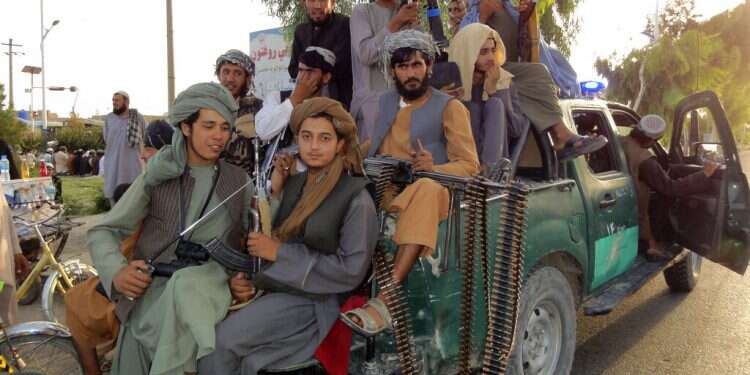Taliban forces have taken control of Afghanistan's presidential palace, two senior Taliban commanders present in Kabul told Reuters on Sunday, after President Ashraf Ghani left the country.
Follow Israel Hayom on Facebook and Twitter
Ghani left the country Sunday, joining his fellow citizens and foreigners in a stampede fleeing the advancing Taliban and signaling the end of a 20-year Western experiment aimed at remaking Afghanistan.
The Taliban, who for hours had been on the outskirts of Kabul, announced soon after they would move further into a city gripped by panic where helicopters raced overhead throughout the day to evacuate personnel from the US Embassy. Smoke rose near the compound as staff destroyed important documents. Several other Western missions also prepared to pull their people out.
Civilians fearing that the Taliban could reimpose the kind of brutal rule that all but eliminated women's rights rushed to leave the country as well, lining up at cash machines to withdraw their life savings. The desperately poor − who had left homes in the countryside for the presumed safety of the capital − remained in their thousands in parks and open spaces throughout the city.
US Secretary of State Antony Blinken rejected comparisons to the US pullout from Vietnam, as many watched in disbelief at the sight of helicopters landing in the embassy compound.
Ghani flew out of the country, two officials told The Associated Press. Abdullah Abdullah, the head of the Afghan National Reconciliation Council, later confirmed that Ghani had left.
"The former president of Afghanistan left Afghanistan, leaving the country in this difficult situation," Abdullah said. "God should hold him accountable."
In a stunning rout, the Taliban seized nearly all of Afghanistan in just over a week, despite the billions of dollars spent by the US and NATO over nearly two decades to build up Afghan security forces. Just days earlier, an American military assessment estimated it would be a month before the capital would come under insurgent pressure.
Instead, the Taliban swiftly defeated, co-opted or sent Afghan security forces fleeing from wide swaths of the country, even though they had some air support from the U.S. military. But a peace deal with the U.S. limited direct military action targeting them, allowing them to prepare and move quickly to seize key areas when President Joe Biden announced his plans to withdraw all American forces by the end of this month.
On Sunday, the insurgents entered the outskirts of Kabul but initially remained outside of the city's downtown. Meanwhile, Taliban negotiators in Kabul discussed the transfer of power, said an Afghan official who spoke on condition of anonymity for fear of reprisals. It remained unclear when that transfer would take place and who among the Taliban was negotiating.
The negotiators on the government side included former President Hamid Karzai and Abdullah, who has been a vocal critic of Ghani.
Taliban officials told Reuters on Sunday that there would be no transitional government, as the group expected a "complete handover" of power.
Meanwhile, Iran said on Sunday it has prepared accommodation in three provinces bordering Afghanistan to provide temporary refuge to Afghans fleeing their country.
"Camps have been built in border areas in three provinces," Interior Ministry official Hossein Qasemi told Iran's state news agency IRNA.
But he added that: "We expect those Afghan refugees to return home when the situation improves in Afghanistan."
Afghanistan's oil-rich western neighbor Iran has for years been a destination for Afghans seeking work or fleeing war.
But the state of Iran's economy has persuaded Tehran to encourage many of the more than 2 million Afghan refugees in the country to return home.
Last week, Israel Hayom published an interview with an Afghan official in Kabul who called Iran's involvement in Afghanistan "suspicious" and said that the Shiite regime appeared to be working with the extremist Sunni Taliban.
Meanwhile, a NATO official told Reuters on Sunday that NATO was maintaining its diplomatic presence in Kabul and helping to keep the city's airport running.
"NATO is constantly assessing developments in Afghanistan," the official said.
"The security of our personnel is paramount, and we continue to adjust as necessary. We support Afghan efforts to find a political solution to the conflict, which is now more urgent than ever," the official said.
Meanwhile, after reports that Afghan women working in banking jobs had been forced to leave by Taliban forces, the Taliban issued statements on Sunday saying that under their reinstated rule, women would be allowed to work, attend school, leave their homes without male guardians, and wear hijabs (rather than burqas).
Subscribe to Israel Hayom's daily newsletter and never miss our top stories!




